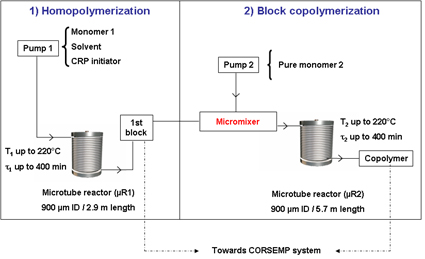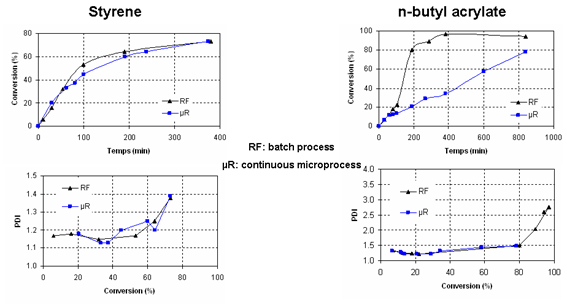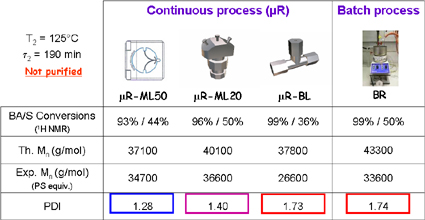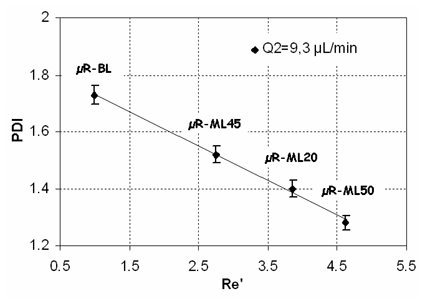
Continuous-flow microfluidic-assisted (co)polymerizations (CFCP)
In this stuy we are interested in the synthesis of (co)polymers
with controlled architecture through a multi-stage continuous-flow microfluidic-assisted
process.
We lately focus on block copolymers synthesis. The setup consists in two serial
microtube reactors both connected to a single micromixer. The first block is
synthesized in the first microreactor by a controlled radical polymerization
(CRP) method. Then the viscous 1st block solution is mixed with the second monomer
within the micromixer. The resulting reactive solution flows then to the 2sd
microreactor where takes place the copolymerization reaction. Both polymers
coming out from the 1st and 2sd reactor are automatically analyzed by the CORSEMP
system.

Mixcromixers:
Different kinds of micromixer were studied: a simple T-junction considered as a bilamination micromixer and several multilamination micromixers with different geometries and dimensions. All tested micromixers have been ranked according to the relative Reynold number which only depends on the width (w) and number (n) of microchannels as well as the width of the slit (h) and the radius of the J-junction.
Some results:
Homopolymers
Depending on the nature of the monomer the benefit of a microtube reactor over conventional labscale batch reactor is different. For the TIPNO nitroxide-mediated polymerization of styrene, no difference is observed. However, for more exothermic reactions, like the polymerization of n-butyl acrylate, a large discrepancy is to be seen. In batch mode, the monomer conversion increases sharply after roughly 100 min of residence time and is rapidly followed by an increase in the polymer polydispersity. In the microtube reactor, the course of the polymerization is quite normal and low polydispersity is achieved even at high monomer conversion.

Copolymers
The ability to synthesize copolymers with low polydispersity is expected to be strongly depends on the mixing of the viscous first block solution with the pure liquid comonomer. As seen in the figures for the synthezise of PBA-b-P(BA-co-S), multilamination micromixers allow the production of block copolymers with the lowest PDIs. This parameter is even linearly correlated with the relative Reynolds number achieved in the micromixer. It means that a specific PDI can be targeted by simply adjusting the dimension of the micromixers keeping constant all other parameters (residence time, concentrations, temperature …). Additionally it gives routes for the fabrication or more efficient micromixers.


Selected papers:
- Garg D.K., C.A. Serra, Y. Hoarau, D. Parida, M. Bouquey and R. Muller, New Transformation Proposed for Improving CFD Simulation of Free Radical Polymerization Reactions in Microreactors, Microfluid. Nanofluid.,18 (5-6) (2015) 1287-1297.
- Garg D.K., C.A. Serra, Y. Hoarau, D. Parida, M. Bouquey and R. Muller, Analytical Solution of Free Radical Polymerization: Applications- Implementing Nonisothermal Effect, Macromolecules, 47 (24) (2014) 8514-8523.
- Garg D.K., C.A. Serra, Y. Hoarau, D. Parida, M. Bouquey and R. Muller, Analytical Solution of Free Radical Polymerization: Applications- Implementing Gel Effect Using CCS Model, Macromolecules, 47 (23) (2014) 8178-8189.
- Garg D.K., C.A. Serra, Y. Hoarau, D. Parida, M. Bouquey and R. Muller, Analytical Solution of Free Radical Polymerization: Applications- Implementing Gel Effect Using AK Model, Macromolecules, 47 (21) (2014) 7370-7377.
- Parida D., C.A. Serra, D.K. Garg, Y. Hoarau, M. Bouquey and R. Muller, Flow inversion: an effective means to scale-up controlled radical polymerization tubular microreactors, Macromol. React. Eng., 8 (8) (2014) 597–603.
- Garg D.K., C.A. Serra, Y. Hoarau, D. Parida, M. Bouquey and R. Muller, Analytical solution of free radical polymerization, derivation and validation, Macromolecules, 47 (14) (2014) 4567-4586.
- Parida D., C.A. Serra, R. Ibarra, D.K. Garg, Y. Hoarau, M. Bouquey and R. Muller, Atom Transfer Radical Polymerization in continuous-microflow: effect of process parameters, J. Flow Chem., 4 (2) (2014) 92-96.
- Parida D., C.A. Serra, D.K. Garg, F. Bally, Y. Hoarau, R. Muller and M. Bouquey, Coil flow inversion as a route to control polymerization in microreactors, Macromolecules, 47 (10) (2014) 3282–3287.
- Parida D., C.A. Serra, F. Bally, D.K. Garg and Y. Hoarau, Intensifying the ATRP synthesis of statistical copolymers by continuous micromixing flow techniques, Green. Proc. Synt., 6 (1) (2012) 525-532.
- Bally F., C. A. Serra, C. Brochon, N. Anton, T. Vandamme, G. Hadziioannou, A continuous-flow polymerization microprocess with online SEC and inline polymer recovery by micromixer-assisted nanoprecipitation, Macromol. React. Eng., 5 (11-12) (2011) 542–547 (invited article).
- Bally F., C. A. Serra, C. Brochon, and G. Hadziioannou, Synthesis of Branched Polymers under Continuous-Flow Microprocess: an Improvement of the Control of Macromolecular Architectures, Macromol. Rapid. Commmun., 32 (22) (2011) 1820–1825.
- Bally F., E. Ismailova, C. Brochon, C. A. Serra and G. Hadziioannou, Mechanistic study of atom transfer radical polymerization in the presence of an inimer: towards highly branched controlled macromolecular architectures through one-pot reaction, Macromolecules, 44 (18) (2011) 7124-7131.
- Bally F., C. A. Serra, V. Hessel and G. Hadziioannou, Micromixer-assisted polymerization processes, Chem. Eng. Sci., 66 (2011) 1449-1462 (invited article).
- Bally F., C.A. Serra, V. Hessel and G. Hadziioannou, Homogeneous Polymerization: Benefits brought by Microprocess Technologies to the Synthesis and Production of Polymers, Macromol. React. Eng. 4 (9-10) (2010) 543-561 (invited article).
- Rosenfeld C., C. Serra, C. Brochon and G. Hadziioannou, Influence of micromixer characteristics on polydispersity index of block copolymers synthesized in continuous flow microreactors, Lab. Chip., 8 (2008) 1682-1687.
- Rosenfeld C., C. Serra, C. Brochon, V. Hessel and G. Hadziioannou, Use of micro mixers to control the molecular weight distribution in continuous two-stage nitroxide-mediated copolymerizations, Chem. Eng. J., 15 (S1) (2008) S242-S246.
- Rosenfeld C., C. Serra, C. Brochon and G. Hadziioannou, High
temperature nitroxide-mediated radical polymerization in a continuous microtube
reactor: towards a better control of the polymerization reaction, Chem.
Eng. Sci., 62 (2007) 5245-5250.
Download posters: